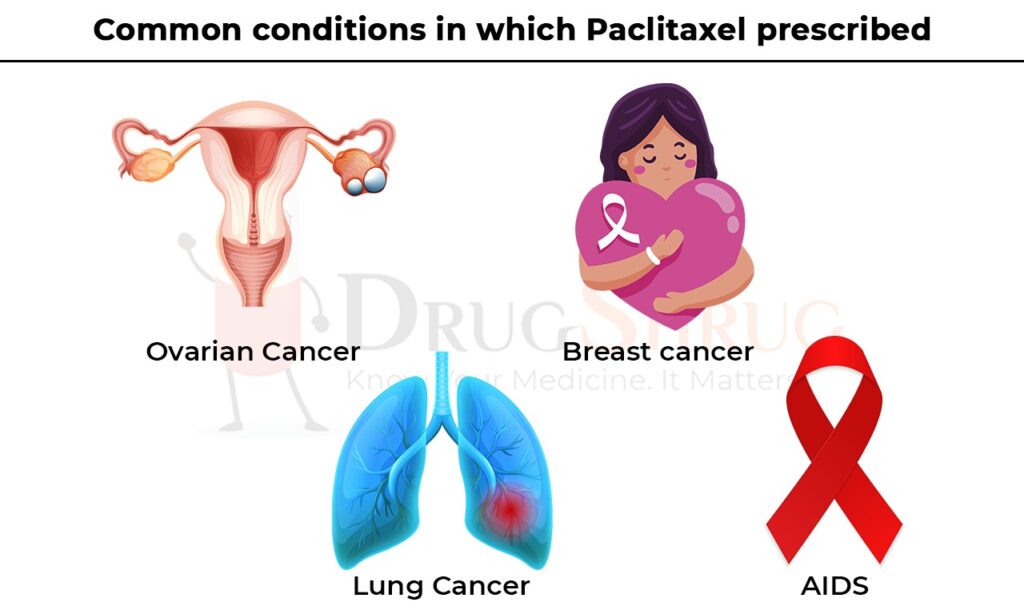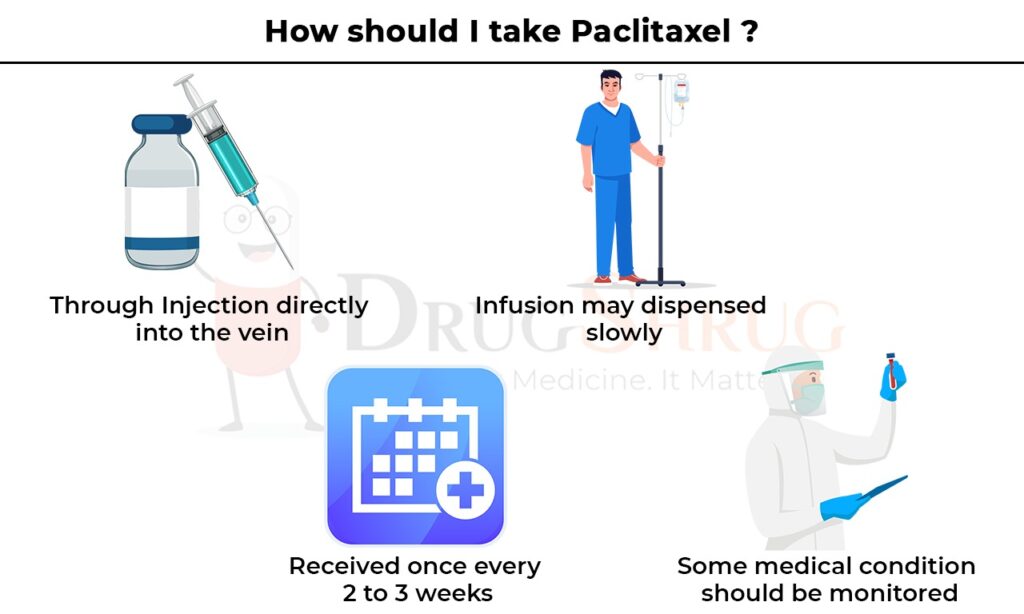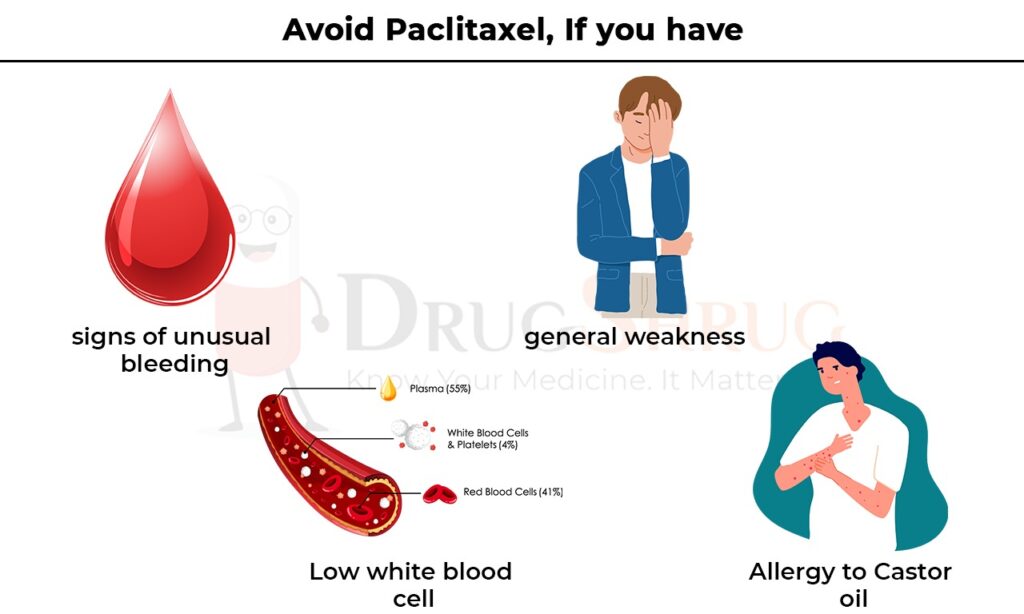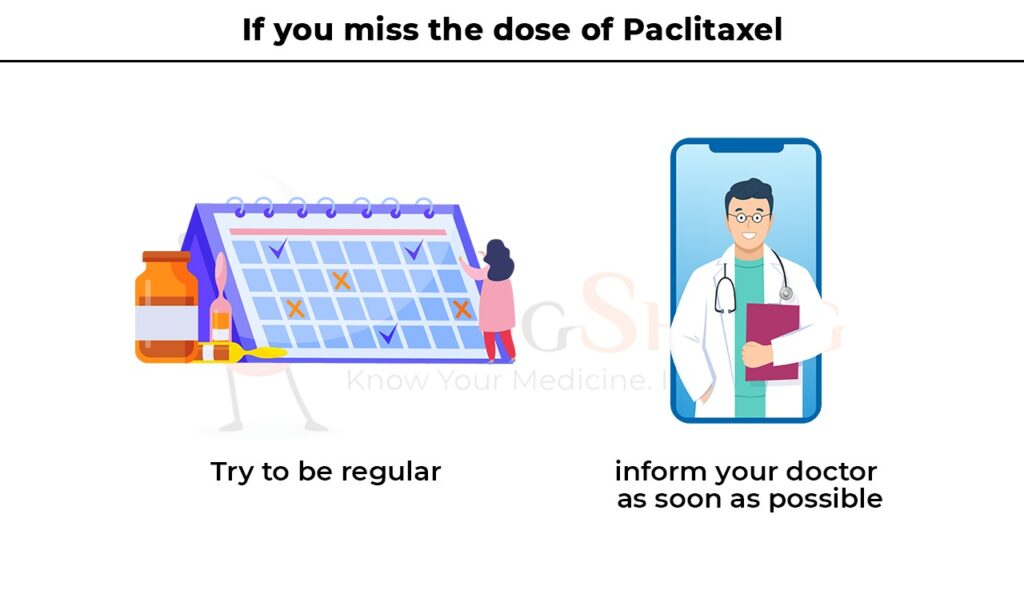What is Paclitaxel?
Paclitaxel is administered to treat ovarian cancer, lung cancer and breast cancer. This medication is also prescribed to cure AIDS- related Kaposi’s sarcoma. It is often given dispensed especially in the instances when other treatments remain unsuccessful. The medication may also be utilized for purposes not mentioned in this concise clinical guide.
What are the common conditions in which Paclitaxel prescribed?
This medicine is generally recommended to treat the following conditions:
- Ovarian cancer
- Breast cancer

- Lung cancer
- AIDS- related Kaposi’s sarcoma
How should I take Paclitaxel?
Paclitaxel is directly administered into the vein as an injection. This injection shall be availed to you by your medical practitioner. This infusion should be dispensed slowly and can go on until 3 to 24 24 for completion. The medication is typically received once every 2 to 3 weeks.

Adhere to your doctor’s dosing directions precisely. When you are getting this injection, your doctor may prescribe certain medicines to avoid allergic reactions. While receiving the infusion, your blood pressure, oxygen levels, kidney function, and other important indicators shall be continuously monitored. In case you experience any burning, pain or swelling about the area where the IV needle was placed for injection, inform your clinician. This drug can decline blood cells which assist in defending against infection and in blood clotting. You may be required to undertake regular blood tests. Depending upon the results of these tests, your cancer treatment might be postponed.
When you should not take Paclitaxel?
This drug can decrease count of blood cells which assist in defending against infection and in blood clotting. This may make you vulnerable to bleeding and getting infections easily. In case you observe any signs of unusual bleeding or symptoms of infection [such as, fever, strep throat, mouth sores, cough], ask for immediate medical assistance.
Do not receive paclitaxel injection if you are sensitive to it or have:
- low white blood cell (WBC) counts; or
- an allergy to castor oil (an ingredient in paclitaxel and other drugs such as cyclosporine or teniposide).

Apprise your doctor if you have ever got
- heart ailments; or
- hepatic [liver] illnesses
This medication might possibly affect the unborn infant. Thus, adopt effective birth control measure to avoid pregnancy and if you get pregnant inform your doctor. Avoid nursing your child while receiving this infusion. It comprises alcohol and may cause slight intoxication when you receive this injection into your vein. Do not consume alcohol on the day you have an appointment for Paclitaxel injection. Keep aloof of the people who are sick or have infections. If you manifest any symptoms of infection, do inform your doctor. Refrain from actions that may heighten the risks of injury or bleeding. Be particularly cautious to avoid bleeding while brushing your teeth or shaving.
What are the possible side effects of Paclitaxel?
If you experience symptoms of allergic response to the medication such as hives, shallow breath, inflammation in your face, lips or throat, seek immediate medical attention.
Tell your doctor immediately if you experience:
- Intense stomach ache or diarrhoea
- symptoms of cold such as stuffy or runny nose, sneezing, strep throat;
- flushing (warmth, redness, or tingling);
- tingling, numbness, or burning pain in your hands or feet;
- serious redness or irritation, swelling or a hard lump, or other skin alters where the injection was received (may occur 7 to 10 days after infusion);
- pain or burning while urination

- cough with mucus, angina [chest pain], feeling short of breath;
- fast or weak heartbeats;
- high dizziness
- serious headache, hazy vision, thumping in neck or ears;
- a convulsion;
- easy bruising, strange bleeding, purple or red spots under the skin;
- low red blood cells count (anaemia): pale skin, unusual fatigue, feeling dizzy or short breath, cold hands and feet; or
- low white blood cell counts: fever, mouth and skin sores, strep throat, cough, difficulty in breathing.
The cancer therapies might be deferred or permanently stopped if you get the following symptoms:
Common side effects may comprise:
- fever, chills, or other symptoms of infection;
- anaemia;
- general weakness, fatigue, or dizziness;
- bleeding;
- difficulty in breathing or swallowing;
- skin rash, hair loss, hives;

- numbness, tingling, or burning;
- puffiness in your face, hands, or feet;
- sores or white patches in or about your mouth;
- joint or muscle pain;
- vomiting, nausea, diarrhea; or
- tenderness or irritation at the place where medicine was injected
However, these all are not the only possible side- effects, as it may show in other symptoms as well. Ask your doctor for clinical guidance about its side effects.
What to do if I miss the dose?
In case you miss the slot scheduled for paclitaxel injection inform your doctor.

Common Drug Interaction with Paclitaxel
Often it is unsafe to take other medicines simultaneously as this can affect blood absorption level of other drugs, increase side effects, or alter the efficacy of the medications.
Other suppositories may interact with this drug, including prescription and over-the-counter drugs, vitamins, and herbal supplements.

It is imperative that you disclose to your doctor regarding your current medicinal course and any medicine that you started or stopped using.
Bottom Line
Paclitaxel is usually advised to cure ovarian, breast and lung cancer as well as AIDS- related Kaposi’s sarcoma. It must be administered specifically under the supervision of your medical professional so as to avoid any adverse consequences. Stick to precautions and if you observe any side- effect visit your doctor at once.
Further Reading:


